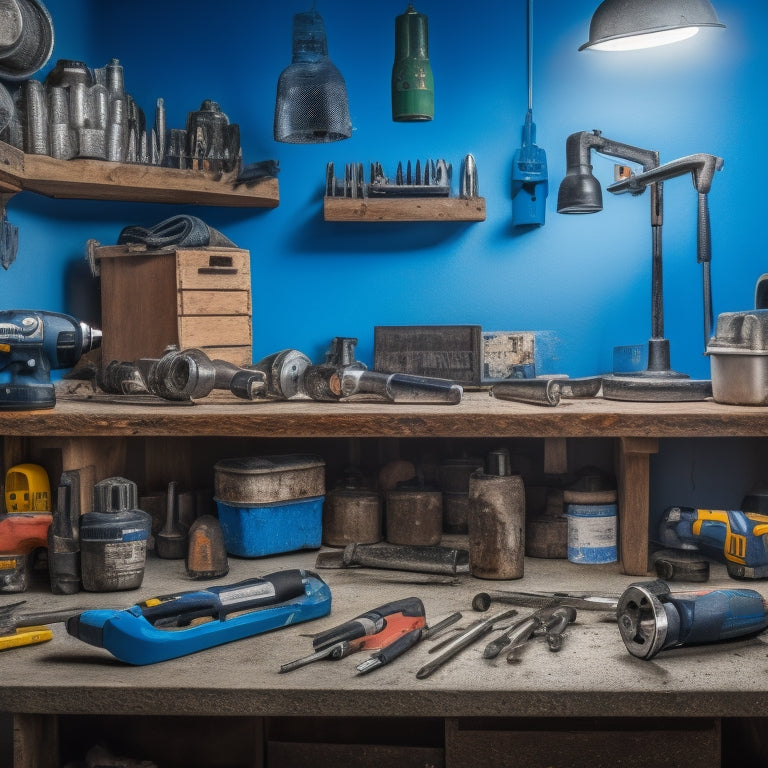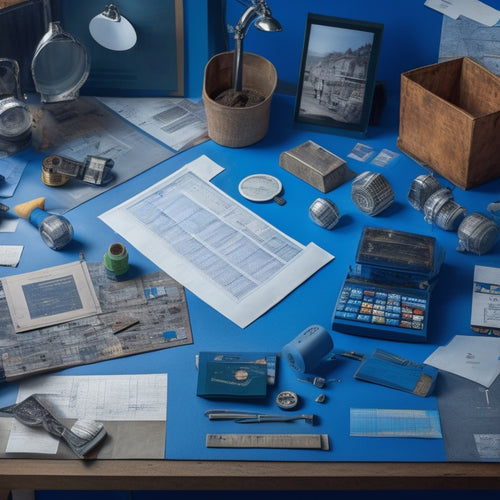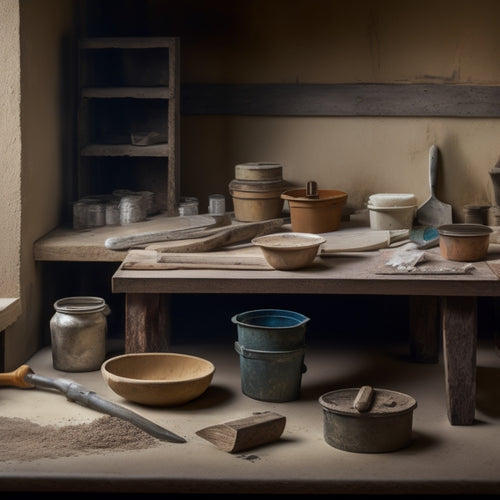
Best Mixers for Home Repair and Renovation
Share
When choosing the best mixer for your home repair and renovation projects, consider the type of mixer that suits your needs. For large-scale projects, high-capacity concrete mixers with robust engines and durable drums are essential. For smaller jobs, electric mixers or portable mixers are ideal. If precision is key, handheld mixers are the way to go. Look for mixers with advanced safety features, such as overheat protection and ergonomic designs, to guarantee safe operation. Additionally, consider budget-friendly options that prioritize power and efficiency without sacrificing quality. As you continue to explore your options, you'll find the perfect mixer to elevate your projects to the next level.
Key Takeaways
• Choose a mixer that suits your project's size and type, considering factors like capacity, concrete type, and additional features.
• Prioritize durability and build quality, looking for sturdy frames, robust engines, and durable drums in concrete mixers.
• Electric mixers are ideal for small to medium-sized projects, offering compact size, variable speed control, and ergonomic handles for comfort.
• Handheld mixers provide precise control and are suitable for tight spaces, small batches, and adhesive application, with ergonomic design and user-friendly controls.
• Consider safety features like emergency stop buttons, guards, and thermal overload protection to ensure safe operation and minimize accidents.
Top Rated Concrete Mixers
Concrete mixers are a vital tool for any home repair project involving foundation work, and you'll want to invest in a top-rated model that can handle heavy loads and deliver consistent results.
When searching for the right mixer, it's important to read concrete mixer reviews from reputable sources to make sure you're getting a reliable machine. Look for models with sturdy frames, robust engines, and durable drums that can withstand heavy use. Additionally, consider the capacity and type of concrete you'll be mixing, as well as any additional features you may need, such as multiple speed settings or a hydraulic tilt.
To guarantee your mixer lasts for years to come, it's important to follow proper mixer maintenance tips. Regularly clean the drum and blades, check the oil levels, and replace worn-out parts promptly. You should also perform routine inspections to identify any potential issues before they become major problems.
Electric Mixers for Small Jobs
When you're tackling small to medium-sized home repair projects that require mixing small batches of materials, an electric mixer is a cost-effective and convenient alternative to heavy-duty concrete mixers.
Electric mixers are ideal for tasks like mixing small amounts of drywall compound, joint compound, or mortar for tile work. They're also great for mixing small batches of epoxy or resin for bonding materials.
One of the key electric mixer benefits is their compact size, making them easy to store and transport. Compact mixer options are perfect for small workshops or job sites with limited space.
They're also lightweight, reducing fatigue and strain when working on extended projects. Additionally, electric mixers are often quieter and produce less vibration than their heavy-duty counterparts, making them a safer choice for indoor projects.
With variable speed controls and ergonomic handles, electric mixers provide precise control and comfort during extended use.
Portable Mixers for Quick Fixes
Portable Mixers for Quick Fixes
You'll often find yourself needing to make quick repairs or touch-ups, and that's where portable mixers come in, providing the power and convenience to tackle small, unexpected tasks on the spot. These compact machines are designed to be lightweight and easy to maneuver, making them perfect for small, tight spaces. With a portable mixer, you can master portable mixing techniques, such as mixing small batches of materials or applying adhesives to tight areas.
Here are some key benefits of portable mixers:
| Compact Mixer Benefits | Description |
| Mix anywhere, anytime | Portable mixers can be used in any location, without the need for a dedicated workspace |
| Lightweight and easy to handle | Compact design makes it easy to transport and store |
| Versatile applications | Suitable for mixing small batches of materials, applying adhesives, and more |
| Space-saving design | Takes up minimal storage space, ideal for small workshops or DIY enthusiasts |
| Convenient power | Often cordless or battery-powered, providing flexibility and ease of use |
When choosing a portable mixer, consider the type of tasks you'll be using it for, as well as the power and features you need. With the right portable mixer, you'll be equipped to tackle those quick fixes and unexpected tasks with ease.
High-Capacity Mixers for Large Projects
You'll require a high-capacity mixer for large-scale projects that demand heavy-duty mixing, such as constructing a deck, building a fence, or renovating a room.
These projects require a mixer that can handle large quantities of materials, guaranteeing mixing efficiency and project scalability. Look for mixers with high-torque motors and large mixing drums to handle the demands of your project.
When selecting a high-capacity mixer, consider the material you'll be working with and the volume you need to mix. For example, if you're working with thick concrete, you'll need a mixer with a high-torque motor to handle the heavy load.
Additionally, consider the mixer's durability and build quality to guarantee it can withstand the rigors of heavy use.
Safety should also be a top priority when working with high-capacity mixers. Make sure the mixer is equipped with safety features such as emergency stop buttons and protective guards to prevent accidents.
Handheld Mixers for Precise Control
Operating in tight spaces or requiring precise control over mixing, handheld mixers are ideal for smaller projects or tasks that demand accuracy and finesse. Whether you're working on a delicate repair or need to mix small batches of material, handheld mixers provide the precision you need. They're also perfect for getting into tight spaces where larger mixers can't fit.
When choosing a handheld mixer, look for an ergonomic design that fits comfortably in your hand, reducing fatigue and strain. User-friendly controls are also essential, allowing you to easily adjust speed and direction. This guarantees you have complete control over the mixing process, minimizing the risk of accidents or messes.
With a handheld mixer, you'll be able to tackle tasks such as mixing small batches of adhesive, applying epoxy, or blending paint with ease. Their compact size and lightweight design make them easy to maneuver, even in confined spaces. By investing in a high-quality handheld mixer, you'll be able to complete smaller projects efficiently and safely.
Best Mixers for Thick Mixtures
When you're working with thick mixtures, you'll need a mixer that can handle the heavy lifting.
You're looking for a machine that can deliver high-torque performance and has a powerful motor to back it up.
To get the job done efficiently, you'll want to prioritize mixers with heavy-duty mixing capacity, high-torque performance, and robust motor requirements.
Heavy-Duty Mixing Capacity
For tackling thick, stubborn mixtures that bog down lesser machines, look for mixers with heavy-duty mixing capacity that can handle high-viscosity materials and dense aggregates with ease. You need a mixer that can withstand the rigors of heavy-duty mixing without compromising on performance or safety.
Here are the key features to look for in a mixer with heavy-duty mixing capacity:
-
Robust motor: A powerful motor that can handle high-torque demands without overheating or stalling.
-
Heavy-duty gearbox: A gearbox that's designed to withstand the rigors of heavy-duty mixing, with a high-torque rating and durable components.
-
Thick, durable drums: Drums that are built to last, with thick, heavy-duty materials that can withstand the rigors of heavy-duty mixing.
-
Rugged construction: A mixer that's built with heavy-duty durability in mind, with a rugged construction that can withstand the demands of heavy-duty mixing.
-
Mixing versatility: A mixer that can handle a wide range of materials and mixing tasks, from concrete to mortar to drywall compound.
High-Torque Performance Needed
You'll need a mixer that can deliver high-torque performance consistently to tackle thick mixtures that would stall or overheat lesser machines.
When dealing with heavy, dense materials, high torque benefits are essential to avoid mixer failure or damage. Look for mixers with high torque specifications, typically measured in inch-pounds (in-lbs) or newton-meters (Nm). A high-torque mixer will efficiently handle thick mixtures, reducing the risk of motor burnout or mechanical failure.
When selecting a mixer, check the torque specifications to guarantee they meet your project's demands. A mixer with high torque will provide the necessary power to mix thick materials without stalling or overheating.
This is particularly important when working with materials like concrete, mortar, or epoxy, which require intense mixing to achieve the desired consistency.
Powerful Motor Requirements
To efficiently tackle thick mixtures, a powerful motor is necessary to back up the high-torque performance, providing the required muscle to drive the mixing process forward. When shopping for a mixer, you'll want to look for one with a robust motor that can handle demanding tasks.
Here are some key factors to take into account:
-
Motor durability: A durable motor will withstand the rigors of heavy use, guaranteeing your mixer remains reliable over time.
-
Torque ratings: Look for a mixer with a high torque rating, as this will provide the necessary power to tackle thick mixtures.
-
Cooling system: A well-designed cooling system will prevent the motor from overheating, reducing the risk of damage or failure.
-
Variable speed control: Having variable speed control allows you to adjust the mixing speed to suit the specific task, reducing the risk of motor strain.
-
Safety features: Take into account a mixer with built-in safety features, such as thermal overload protection, to prevent accidents and guarantee safe operation.
Mixers for Fast Setting Concrete
When working with fast-setting concrete, you need a mixer that can keep up with the rapid hydration process, delivering a consistent blend that sets quickly and achieves ideal strength. This requires a mixer that can efficiently handle the unique demands of fast-setting concrete.
Look for a mixer with advanced mixing techniques, such as planetary mixing or twin-shaft mixing, which can handle the high-flow rates and fast hydration times of fast-setting concrete.
To guarantee the right concrete consistency, you'll want a mixer that can accurately control the water-to-cement ratio and maintain a consistent mixing speed.
A mixer with variable speed control and a built-in timer can help you achieve the perfect mix. Additionally, consider a mixer with a large mixing drum and a powerful motor to handle the high-viscosity mix of fast-setting concrete.
Budget-Friendly Mixers for Homeowners
When you're on a tight budget, you don't have to sacrifice quality for affordability.
You'll find that budget-friendly mixers for home repair can still pack a punch, offering reliable performance without breaking the bank.
As you explore your options, you'll discover that cost-effective solutions can be found in mixers that prioritize power and efficiency over fancy features.
Affordable Options Abound
Explore a range of budget-friendly mixers that won't break the bank, offering homeowners reliable performance for small to medium-sized projects.
As a DIY enthusiast, you don't need to sacrifice quality for affordability. When it comes to economical renovation tools, you can find mixers that meet your needs without draining your wallet.
Here are some affordable options to examine:
-
Wagner Spraytech 0518080: A compact and lightweight mixer perfect for small DIY projects, priced under $20.
-
Black+Decker MX1500W: A 1.5-amp mixer with a comfortable grip and variable speed control, available for under $30.
-
Ryobi P630: A 6-amp mixer with a robust motor and adjustable speed, priced around $40.
-
DEWALT DW130V: A 3.5-amp mixer with a durable design and ergonomic grip, available for under $50.
-
Makita XRM02W: A 1.5-amp mixer with a compact design and variable speed control, priced around $60.
These budget-friendly mixers are perfect for DIY home improvement projects, offering reliable performance without breaking the bank.
Power on a Budget
You'll find that these budget-friendly mixers pack a surprising amount of power, making them ideal for tackling small to medium-sized projects around the house. When it comes to budget buying, you don't have to sacrifice performance for affordability. Look for affordable brands that offer reliable and efficient mixers that can handle tasks such as mixing mortar, concrete, or drywall compound.
When selecting a mixer, consider the motor's horsepower, drum capacity, and gear ratio. A higher horsepower motor will provide more power, while a larger drum capacity means you'll need to refill less often. A lower gear ratio will provide more torque, making it easier to mix thick materials.
Additionally, pay attention to safety features such as a secure grip, ergonomic design, and a stable base to prevent accidents. Some budget-friendly mixers may lack advanced features, but they'll still get the job done.
Cost-Effective Solutions Found
For homeowners on a tight budget, finding a cost-effective mixer that still delivers reliable performance can be a game-changer for tackling small to medium-sized projects around the house. You don't have to break the bank to get the job done. By opting for a budget-friendly mixer, you can allocate more resources to other essential aspects of your DIY renovation tips.
Here are some cost-effective solutions to contemplate:
-
Hammer drills with built-in mixers: These multi-functional tools offer excellent value for money, allowing you to tackle drilling, mixing, and driving tasks with ease.
-
Entry-level mixers from reputable brands: Look for brands that offer affordable entry-level mixers without compromising on performance and durability.
-
Refurbished or certified pre-owned mixers: Refurbished mixers can provide significant cost savings while still offering reliable performance.
-
Manual mixers: For smaller projects, manual mixers can be a cost-effective alternative to electric mixers.
-
DIY mixer attachments: Contemplate purchasing mixer attachments that can be used with your existing power tools, reducing the need for a standalone mixer.
Mixers With Advanced Safety Features
When handling power tools, your top priority is protecting yourself from potential hazards, and mixers with advanced safety features can considerably reduce the risk of accidents and injuries. You want a mixer that's designed with your well-being in mind, and that's where user ergonomics come into play.
Look for mixers with comfortable grip handles, adjustable speed controls, and a balanced design that reduces fatigue and strain. These features guarantee you can work efficiently without compromising your safety.
In addition to user ergonomics, advanced safety features such as overheat protection, thermal overload protection, and automatic shut-off in case of an emergency can be lifesavers. Some mixers also come equipped with safety switches that prevent accidental start-ups, and others have protective guards that prevent debris from flying out during operation.
When shopping for a mixer, don't compromise on safety. Opt for a mixer that prioritizes your protection and has a proven track record of reliability. By doing so, you'll be able to tackle your home repair and renovation projects with confidence and peace of mind.
Frequently Asked Questions
What Is the Ideal Mixer Size for a Small to Medium-Sized Renovation Project?
When tackling a small to medium-sized renovation project, you'll want a mixer that's the right fit.
Look for ideal mixer dimensions that balance capacity and portability. A mixer with a drum volume between 3-5 cu. ft. is usually suitable.
Don't forget mixer weight considerations - a lighter mixer (around 100-150 lbs) is easier to maneuver and reduces strain on your back.
This sweet spot guarantees you can efficiently mix materials without sacrificing safety or convenience.
Can I Use a Mixer for Both Concrete and Mortar Mixing Tasks?
When tackling both concrete and mortar mixing tasks, you'll want to guarantee you're using the right equipment.
While it's technically possible to use a mixer for both, it's vital to take into account the differences between concrete mixing and mortar mixing.
Concrete mixing requires a more aggressive mixing action, whereas mortar mixing needs a gentler approach to prevent over-mixing.
How Often Should I Clean and Maintain My Mixer for Optimal Performance?
You should establish cleaning schedules and follow maintenance tips to guarantee your mixer performs at its best.
Set a routine to clean the mixer after each use, removing excess material and debris.
Regularly inspect and replace worn or damaged parts.
Lubricate moving components and check electrical connections monthly.
By doing so, you'll prevent accidents, reduce wear and tear, and extend the mixer's lifespan.
Are There Any Specific Safety Precautions I Should Take When Using a Mixer?
When operating a mixer, you should prioritize mixer safety to avoid accidents.
Always wear protective gear like gloves, safety glasses, and a dust mask to shield yourself from flying debris and dust.
Ascertain the mixer is placed on a stable, level surface, and keep loose clothing and long hair tied back.
Never leave the mixer unattended while it's in operation, and always unplug it when not in use.
Can I Rent a Mixer Instead of Buying One for a One-Time Project?
Imagine you're a chef preparing a one-time catering gig - you wouldn't invest in a commercial kitchen, right?
Similarly, for a one-time project, renting a mixer can be a cost-effective solution. You'll avoid the upfront cost of buying and storing a mixer.
Rental advantages include flexibility and access to high-end models you mightn't afford to buy.
Compare the rental cost to buying - you might be surprised at the savings.
Conclusion
You've got the blueprints, the materials, and the determination to tackle that home repair or renovation project. Now, it's time to get mixing!
With the right mixer, you'll be building like a medieval mason in no time. From concrete to quick fixes, we've got your needs met.
Whether you're a DIY novice or a seasoned pro, our top-rated mixers will help you lay the foundation for a job well done.
So, gear up and get ready to mix, match, and conquer!
Related Posts
-

5 Best Home Renovation Project Timeline Checklists
You're looking for a clear understanding of the timeline for your home renovation project. A good place to start is w...
-

Top 5 Plastering Tools for Small Renovation Jobs
For small renovation jobs, you'll want to start with the top 5 crucial plastering tools: a putty knife for applying a...
-

3 Best Planter Shopping Timeline Tips for Renovators
When incorporating planters into your renovation project, you'll want to plan carefully to avoid delays and guarantee...


